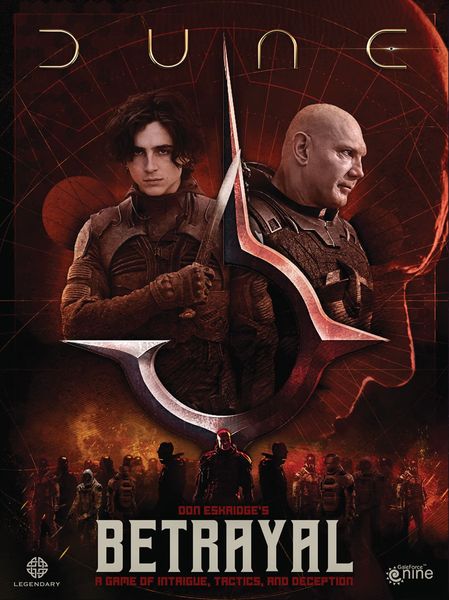Dune: Betrayal (2021) Board Game
Dune: Betrayal is a board game based on the iconic Dune universe created by Frank Herbert. Released in 2021, the game is designed by Don Eskridge and published by Gale Force Nine, known for their high-quality board games.
Game Components of Dune: Betrayal
How To Setup Dune: Betrayal
Players start by receiving secret identity cards, which can be nobles or fighters from either House Atreides or House Harkonnen. The number of identities handed out depends on the player count. Notably, the Baron Harkonnen and Beast Rabban discover the Harkonnen fighters at the beginning by having everyone close their eyes, then the fighters raise their hands, and the Baron/Rabban opens their eyes to see them. Each player receives two trait cards that they place face down in front of them, which combined reveal their role.
Gameplay Mechanics and Game Objective
Player Experience
The game is designed to be quick, lasting between 20 to 40 minutes, depending on the number of players. Players must use their action cards strategically to gather information and make educated guesses about other players’ identities. However, the game can feel somewhat arbitrary, especially with fewer players, as it becomes easier to deduce identities. The social deduction aspect is engaging, but some players have noted that it lacks the intense moments of betrayal and shock found in other games of the same genre.
Pros
Cons
Personal Thoughts on Dune: Betrayal
**Dune: Betrayal** is suitable for fans of the *Dune* franchise and those who enjoy social deduction games, although it may not stand out strongly against other games in the genre. It is best played with a larger group to maximize the complexity and engagement of the game. However, for those seeking a more intense and suspenseful social deduction experience, other games like *The Resistance* or *Werewolf* might be more satisfying.
We are supported by our audience. When you purchase through links on our site, we may earn an affiliate commission, at no extra cost for you. Learn more.

